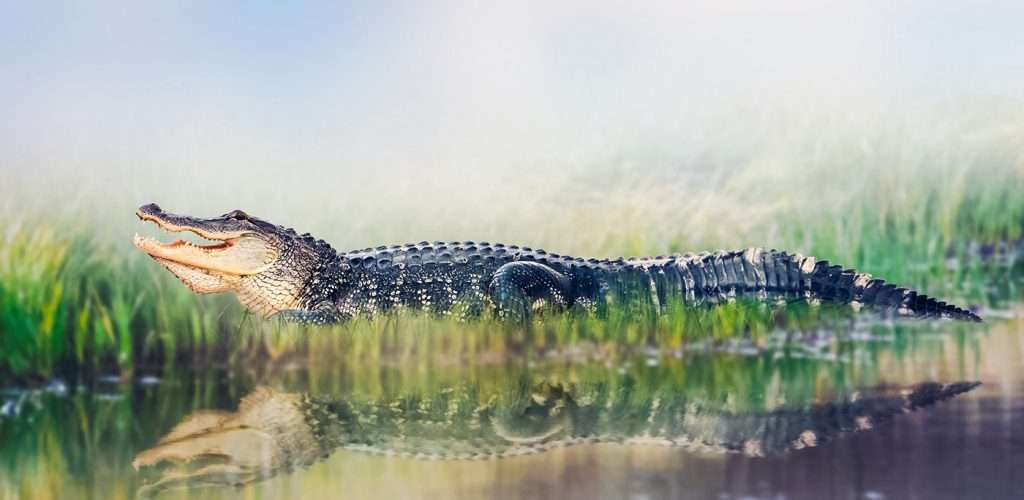If you plan on kayaking the freshwater rivers, inlets and waterways of either Alabama, Arkansas, Florida, Georgia, Louisiana, Mississippi, North Carolina, Oklahoma, South Carolina or Texas, there’s a good chance that you’ll encounter an alligator at one point or another. These dinosaur-like apex predators of the river instill a natural sense of fear in most humans, but this innate sense of fear is only intensified when you observe an alligator while kayaking.
But is it really safe to kayak in waters where alligators are known to live?
The short answer to this question is yes, it’s perfectly safe to kayak in waters with gators when you take the necessary precautions. Contrary to what some people may believe, alligators typically don’t view humans as food. In all actuality, they see humans as potential predators, which is true considering the thousands of gators hunted and killed each year in the U.S. With that said, there have been documented reports of fatal alligator attacks, so you want to follow some basic safety precautions when you’re kayaking around them.
While alligators are considered a low threat to humans, crocodiles are a serious threat. There’s a big difference in the level of danger between a crocodile and an alligator. The good news is that crocodiles aren’t native to the U.S., so you don’t have to worry about encountering them during your kayaking trips. If you find yourself visiting South America, Central America, Asia or Africa, beware of the danger these animals pose to humans.
Rules to follow when kayaking with alligators:
- Never feed a wild alligator, as this will only make it more likely to approach humans in the future.
- Never dispose of fish guts by tossing it off the dock.
- Don’t try to pet an alligator.
- Keep your distance from baby alligators, as the mother may show signs of aggression.
- Don’t hit or harass an alligator with your paddle.
It’s not uncommon to see an alligator suddenly dip into the water when a kayak approaches. Some people may frantically try to paddle in the opposite direction, fearing the gator is hunting them. The truth, however, is that the alligator is simply trying to get into the water where they are more comfortable. Seeing a large kayak floating their way will likely scare the gator, causing it to dive down into the water for cover. The gator isn’t trying to attack or hurt you but rather seek cover.
When Alligators Are Most Aggressive?
While alligators are typically considered docile creatures, there are times when they will show aggression. During breeding season in June and July, an alligator will be more aggressive than usual. They’re also known to become extremely territorial during this period. The only way you can really stay safe around these animals during this time is to move away from their habitat. This means moving away from them quickly if one suddenly appears out of the water nearby.
It should be noted that most fatalities caused by gators occur between June and August when young males roam in search of mates. If you run across a small gator that has begun to lose its tail due to amputation, it’s best not to get too close to the gator. Swim quickly in the opposite direction to avoid any problems with the animal.
There are many unfounded myths about alligators, including their willingness to attack humans for no reason. The truth is that attacks on humans by alligators are very rare. There’s a good chance you’ll never see an alligator during your kayaking adventure unless you take special precautions not to attract them or bother them during the breeding season. To recap, it is safe to kayak around alligators as long as you follow these simple rules: don’t feed them, keep your distance from small gators be mindful of their breeding seasons, and don’t get too close to them.
Will Alligators attack a kayak?
As mentioned above, alligators are not an immediate threat to kayakers; however, they may view you as a potential danger. They may show signs of aggression or fear, depending on their environment and the situation. While swimming in open water is safe, it’s best to stay cautious while near these animals. Should an alligator become aggressive towards your kayak, try to remain calm.
You should paddle away quickly if you notice any sudden movements from the animal or see its jaws open wide (it will either be about to bite you or make a loud hissing sound). If this happens, get yourself out of the water as quickly as possible and wait for a period before returning with another kayak group.
What do I do if an alligator jumps in my kayak?
Don’t panic if an alligator decides to make your kayak its new habitat. Remain calm and remember that the animal isn’t trying to attack you, but rather get into a safe place out of the sun. He will likely swim over your kayak, climb over it or simply sit on top of the kayak for hours without moving. If this happens, try not to disturb him by using flashlights, making loud noises or bringing attention to yourself through movement. Once he’s ready, he’ll return back to open water by climbing out of your boat. Alligators have poor eyesight so they rely on their other senses while hunting prey or locating food.
It’s important not to try to scare or provoke the animal or you’ll risk serious injury. If the alligator is in a different seating position than you and seems to be eyeing you as its next meal, try to remain calm and swim slowly away from it so as not to startle the animal.
Nesting Female alligators
For the most part, nesting female alligators aren’t a concern for kayakers. However, there are some precautions you’ll need to take if you happen upon a female guarding her nests or newly hatched alligators. Don’t get too close to a nesting mother gator and avoid any areas where numerous small gators have been sighted. If she becomes aggressive towards your kayak after you’ve moved away from the area, keep in mind that her behavior is likely based on fear for her offspring’s safety.
What to do if an alligator bites my kayak?
Stay calm and try not to panic. If this happens, assess the animal’s position on your kayak and around your equipment before doing anything else. If he is biting your boat, remain still until he disappears into the water – then paddle away quickly just in case he returns. If possible, take photos or video footage of the event so that you can use it for insurance purposes should anything go wrong. Boat repair companies may offer discounts if they receive proof of an attack. Otherwise, stay safe by carefully removing yourself from any potential danger when out on open water!
Alligator body language
Alligators display different behaviors depending on their environment, so it’s important to know common signs of aggression. If you see any of these signs while kayaking with gators, get yourself out of the water immediately:
● Swimming towards your kayak at high speeds
● Tensing its jaw & opening its mouth wide
● Bumping into your kayak or staying nearby for an extended period
● Making loud hissing noises
So should I go kayaking with gators?
If your main goal is to see these animals up close, then kayaking may not be your best option. Gators are most active during sunrises and sunsets (and mating season), making it difficult for them to see where they’re going at times. You’ll most likely feel more confident sightseeing on flat water during the day – just stay cautious of any wildlife that crosses your path. It’s perfectly safe to fish (and swim) in gator-infested water as long as you follow the rules listed above.

